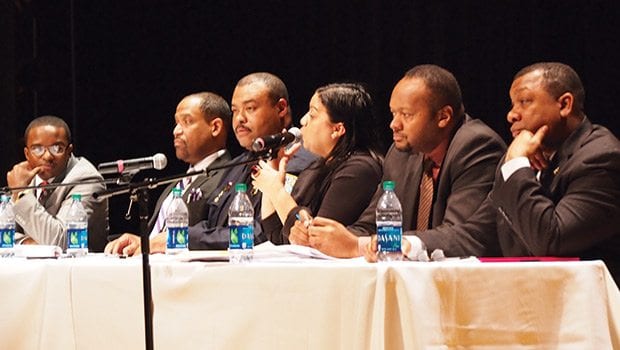

Community members listened at Roxbury Community College as a panel discussed police-community relations.
Harvard Law Professor Ron Sullivan sees ending police profiling as a win-win scenario, given that blacks don’t want to be profiled, and police don’t want ineffective policing strategies.
“In every jurisdiction that has kept data on stop-and-frisk, two things are important,” he said, speaking during a forum on police brutality at Roxbury Community College. “Blacks are stopped disproportionately and blacks are not found to have contraband at greater rates than whites. Often it’s lower.”
While Boston police deny they have a stop-and-frisk policy — a point Police Superintendent in Chief William Gross repeated during the forum last week — forum participants and audience members repeatedly recounted instances of being unfairly targeted for police stops.
The forum, sponsored by the Alpha Phi Alpha fraternity and the Myrtle Baptist Church, drew a large audience to RCC’s Media Arts Center auditorium to hear from five panelists, including Sullivan, Harvard junior Colin Marts, community organizer Elizabeth Miranda, Boston Branch NAACP President Michael Curry and Suffolk County Sheriff Steve Tompkins.
The RCC event comes as there is increasing conversation at the national level on police reforms in the wake of high-profile police killings of unarmed blacks, including Michael Brown in Ferguson, Missouri, Eric Garner in Staten Island, New York and Tamir Rice in Cleveland, Ohio. The killings, coupled with subsequent decisions by grand juries not to indict the officers involved, have added fuel to a national Black Lives Matter movement and sparked demonstrations in nearly every major U.S. city.
Deeply-rooted bias
At the heart of the community’s problems with police, Curry said, are preconceived notions of black men and criminality. He questioned whether police would react differently to seeing a white man running out of a house with knife in his hand than they would seeing a black man in Dorchester under the same circumstances.
“When you enter our communities, you’re going to pull the trigger that much faster,” Curry said.
“What’s at the bottom is this notion of race as a proxy for criminality,” Sullivan said. “It’s bad policing, it makes no sense whatsoever, but race so insinuates itself into our daily existence that we can’t even see past it.”
Panelists and audience members shared stories of what many said were instances of police profiling. Sullivan said he was stopped by Cambridge police as an undergraduate at Harvard while carrying a book bag and “looking like the picture of a student.”
Sullivan focused his comments on the needs for police reforms, including independent investigations of police-involved shootings and police misconduct. The current system, where the police themselves and the district attorneys who work with the police investigate misconduct, does not work, he said.
“We are in an atmosphere where the fox is guarding the hen house,” he commented.
Curry agreed.
“The reality is that the system is weighted toward the officer,” he said.
Curry said the Boston Police Department has a long way to go in rooting out racism among its ranks, pointing out the January 5 incident where an off-duty Boston police officer used racial epithets on a Latino Uber driver and an African American man who intervened to stop the officer from beating the driver.
“Chief Gross is in a tough position,” Curry said.
“That’s alright,” Gross responded. “My ancestors fought for me to be here.”
Legislative solutions
Sullivan stressed that it is important for communities that are affected by racial profiling and police abuse to become involved in the legislative process.
“The problem with the Trayvon Martin case was not the verdict,” he said. “The problem was three years before, nobody came out to fight the Stand Your Ground legislation.”
Vigilante George Zimmerman invoked Florida’s controversial Stand Your Ground law in his defense while on trial for shooting Trayvon Martin, an unarmed teenager who died clutching a packet of Skittles he had just purchased from a variety store.
“There was a Stand Your Ground Law proposed here in Massachusetts,” Sullivan noted. “It was only because of Trayvon Martin that it did not go forward.”
Massachusetts Legislative Black and Latino Caucus members filed a number of bills in January aimed at curbing police abuse, including a laws that would require police to disclose data on the race of pedestrians and drivers they stop and the reasons for stopping them, and laws that would mandate an independent inspector general to investigate officer-involved shootings.
None of the panelists commented directly on the legislation advanced by the Caucus.
Tompkins commented on the anti-police abuse demonstrations, singling out the January 15 protest, in which 29 demonstrators were arrested for shutting down traffic on Interstate 93.
“It got attention,” he said. “We have to do things that get attention.”
Curry suggested police need better training on how to recognize their own hidden prejudices.
“Every officer needs to get alone in a room and face their own implicit biases,” he said.
Gross agreed that police and communities of color have work to do in forging better relationships, and cited dialogues with youth as an example.
“We’ve moved forward as a department and we’re willing to move forward as a community, because we’re part of the community,” he said.
“We have to change the perception that all police officers are the same,” he said later during the discussion. It’s incumbent on us as a department to change that perception.”






